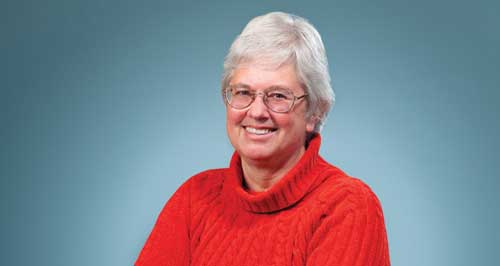This year's winner of The Ingrid Speaker Medal is helping science understand the cognition and behaviour of octopuses and other cephalapods.
A world-renowned authority on octopus and squid behaviour, Dr. Jennifer Mather has been profiled in publications like the New York Times and Discover magazine, spoken at the prestigious TED (Technology, Entertainment and Design) conference, and conducted research around the world.

Dr. Jennifer Mather is a world-renowned authority on octopuses.
It's these achievements – and many others – that led to Mather's most recent accolade: The Ingrid Speaker Medal for Distinguished Research, Scholarship or Performance.
For almost three decades, the psychology professor and one-time CAETL Teaching Fellow, has taught thousands of undergraduates at the University of Lethbridge everything from child development to the psychology of aging, while maintaining a rigorous research program defined by international collaboration and jet-setting to tropical locales. And, at 67, Mather's still as busy as ever.
"I'm probably trying to model what I teach, which is that we have a full lifespan, thank you, and we should use it," she says.
As one of the University's most accomplished and longest serving faculty members, Mather is an intuitive choice for the prestigious Ingrid Speaker Medal. But the idea of an international expert on squids and octopuses residing at a land-locked university in southern Alberta's dusty prairies is unintuitive, to say the least.
Mather's fascination with cephalopods – a category of boneless marine creatures which includes octupuses, squids and cuttle fish – began long before she set foot in Lethbridge. Growing up in Victoria, B.C., she spent a lot of time at the ocean shore, investigating the critters that dwelled in the water and sand.
As a child, she was certain she'd study marine life in some capacity, but wasn't sure how. Finally, in the last year of an undergraduate biology degree at the University of British Columbia, Mather took an animal behaviour class that clarified her path.
"Bingo. I said, 'Okay. This is what I want to do.' "
After completing a biology master's degree in octopus behaviour at Florida State University, she went on to begin a PhD in psychology at Brandeis University in Massachusetts. Upon completion of post-doctoral research at Brandeis in 1978, Mather and her husband looked to return to Canada with their two children. In 1980 she took up a prestigious University Research Fellowship at the University of western Ontario, then spotted a tenure-track position at the U of L five years later and took the leap.
Lethbridge is nowhere near the natural habitats of cephalopods, but it's never been an impediment to Mather. She conducts field work related to squid displays (for instance, how they use their skin colour or tentacle movement to communicate) at the Caribbean island of Bonaire. At the Seattle Aquarium, she collaborates with Roland Anderson to study octopus cognition.
While many of us know octopuses mainly as odd, unique sea creatures, they're a far more intelligent and creative species than given credit. Researchers first realized the octopus's ability to solve problems in the 1960s, but the matter wasn't explored in breadth until the last couple of decades. In the course of her career, Mather has helped prove that octopuses have different personalities, can solve problems (like opening jars to eat food inside) and play.
While Mather is best known for her work on cephalopods, her research is broader: she's also explored how motor control problems can indicate brain dysfunction (like schizophrenia), care issues related to Alzheimer's disease, and successful university teaching. She's also recently co-authored a book about octopuses for the general public, entitled Octopus: The Ocean's Intelligent Invertebrate.
"I have my fingers in a lot of pies," she admits. "I think it came about by accident, but I'm glad it did. I didn't want to be the kind of researcher to sit in a lab and do nothing else. I also think, as a scientist, I have an obligation to help people understand these animals."
This story first appeared in the Legend. For a look at the Legend in a flipbook format, follow this link.
